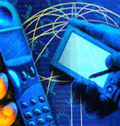
|
CompSci595N/PolSci594N/Engl593: The Technology and Society Seminar Series Seminar Series Overview |
Winter 2005
Fall 2005
Spring 2006
Fall 2006
Spring 2007
Seminar Details The Technology and Society Seminar Series is a continuing course bringing together faculty and students with research interests at the intersection of technology and its impact on society. The broad goals of the seminar are to:
(2) study the body of relevant existing literature (3) identify new problems for inter-disciplinary study (4) foster the creation of research groups who target these research areas Series Offerings The seminar meets weekly during the quarter (except for Dead Week) for approximately an hour and a half. The dates and location details are available on the web page for the specific quarter:
Faculty Participants Kevin Almeroth: Kevin Almeroth is a Professor in the Department of Computer Science with appointments in the Media Arts and Technology (MAT) Program, the Computer Engineering (CE) Program, and the Technology Management Program (TMP). Kevin is also the Associate Director of the Center for Information Technology and Society. Kevin's interests lie on both sides of the intersection of technology, its applications, and its impact on users. On the technology side, his research interests include computer networks and protocols, wireless networking, and large-scale multimedia systems. On the impact side, Kevin is interested in the effects of technology in the classroom, the roll out of new wireless-based services, and incentives for using new systems. (http://www.cs.ucsb.edu/~almeroth/)
Chuck Bazerman:
Charles Bazerman, Professor and Chair of the Department of Education is
interested in the social dynamics of writing, rhetorical theory, and the
rhetoric of knowledge production and use. His interest in technologies
focuses on how new forms of mediation change the socio-rhetorical
landscape and how rhetorical practices may realize new forms of social
cooperation and organization. His most recent books are a collection of
essays co-edited with David Russell on writing and activity theory,
Writing Selves/Writing Societies, (available online at
http://wac.colostate.edu/books/selves_societies/ ) and a methods book on
textual analysis co-edited with Paul Prior, What Writing Does and How It
Does It. His book, The Languages of Edison's of Edison's Light , won the
American Association of Publisher's award for the best scholarly book of
1999 in the History of Science and Technology. Previous books include
Constructing Experience, Shaping Written Knowledge: The Genre and Activity
of the Experimental Article in Science, The Informed Writer: Using Sources
in the Disciplines, and Involved: Writing For College, Writing for Your
Self. He is currently editing the Handbook of Writing Research and is
editor of the Reference Guides of Rhetoric and Composition.
Bruce Bimber: Bruce Bimber is Director of the Center for Information Technology and Society and Professor in the departments of Political Science and Communication at UCSB. His research examines the relationship between evolving information technology and changes in human behavior, especially in the domains of political organization, collective action, social capital, and political deliberation. He is author of Information and American Democracy: Technology in the Evolution of Political Power (Cambridge University Press, 2003), Campaigning Online: The Internet in U.S. Elections (Oxford University Press, 2003, with Richard Davis), and The Politics of Expertise in Congress: The Rise and Fall of the Office of Technology Assessment (SUNY Press, 1996).
(http://www.polsci.ucsb.edu/faculty/bimber/)
Jennifer Earl: Jennifer Earl is an Assistant Professor
of Sociology at the University of California, Santa Barbara. Her research
emphases include social movements and the sociology of law. Within the
study of social movements, she is interested in the impact of the Internet
on protest and social movements and innovative forms of online protest,
among other topics. (http://www.soc.ucsb.edu/faculty/earl/)
Alan Liu: Alan Liu is a Professor in the English Department at the University of California, Santa Barbara. He is the principal investigator of the NEH-funded Teaching with Technology project at UC Santa Barbara entitled Transcriptions: Literature and the Culture of Information, and co-director of the English Dept's undergraduate specialization on Literature and the Culture of Information. He is also a member of the Board of Directors of the Electronic Literature Organization and active in its PAD Initiative (Preservation / Archiving / Dissemination of Electronic Literature),
for which he was lead author of the white paper, "Born-Again Bits: A Framework for Migrating Electronic Literature". In 2004, Liu published The Laws of Cool: Knowledge Work and the Culture of Information (Univ. of Chicago Press). Most recently, he has started the interdisciplinary research project titled Transliteracies: Research in the Technological, Social, and Cultural Practices of Online Reading, which in July 2005 received funding as a five-year UC Multi-Campus Research Group.
(http://www.english.ucsb.edu/faculty/ayliu/summary.html)
Lisa Parks: Lisa Parks is an Associate Professor in the Department at Film and Media
Studies at UC-Santa Barbara. Her research explores the social and cultural
implications of satellite, television, and computer technologies in a
global context. She is the author of Cultures in Orbit: Satellites and the
Televisual (Duke University Press 2005) and co-editor of Planet TV: A
Global Television Reader (NYU Press 2002). She has also published essays in
the journals Screen, Television and New Media, Social Identities, and
Ecumene and in books such as MediaSpace, The Visual Culture Reader, and
Residual Media. She has conducted research in the US, Australia, and former
Yugoslavia, and traveled to Mongolia last summer to study emerging media
technologies there. Parks has taught as a visiting professor in the School
of Cinema-TV at USC and at the Institute for Graduate Study in the
Humanities in Ljubljana, Slovenia. She is also co-producer of several media
projects including Experiments in Satellite Media Arts and LOOM
, and is a
co-investigator in an international research initiative called the
Transcultural Geography Project with colleagues from Holland, Germany, Switzerland, Slovenia and Turkey.
Her new book project is called Mixed Signals: Media Technologies and Cultural Geography.(http://www.filmstudies.ucsb.edu/faculty/parks/html/bio.html) |